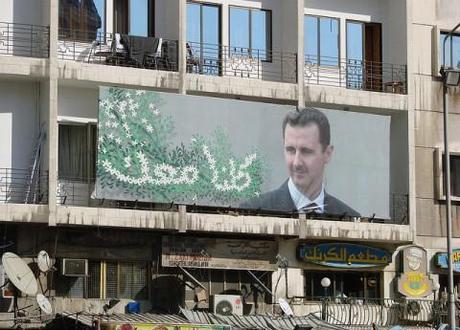
al-Assad propaganda. Photocredit: watchsmart
Violence continues in Syria, where the death toll is now thought to have reached 5,400, with 50 people dying in the bombing of Homs. The New York Times reports that Syrian government tanks are assaulting several rebellious areas. President Bashar al-Assad’s forces are still powerful; the opposition, in the shape of the Free Syrian Army, lacks organisation and resources. Assad is backed by Russia and China, who vetoed a UN resolution at the weekend that sought his resignation. Russian Foreign Minister Sergey Lavrov met Assad this week; he claims that the violence in Syria is due to both sides, and that Assad wants his Vice President to talk to opposition leaders. The New York Times reported that Russia was arguing that its efforts at stopping the bloodshed were “far more productive and balanced than the combined Western and Arab plan.” China, too, remains anti-intervention. Meanwhile the West considers its plans, and finds itself in a quandary.
“We should start considering … arming the opposition. The bloodletting has got to stop,” Sen. John McCain said, quoted on CBS News.
So what options are left? The United States under President Obama is not considering invasion, or even arming the rebels, reported CBS News. The country is instead looking at how it can provide “humanitarian aid.” Sanctions are in place, though they haven’t checked military operations, and the US is trying to get the Arab nations united to pressure Assad from power. The European Union is also going to put in place tougher sanctions. CBS News said “It’s unclear whether any of the US strategies will produce the optimal result anytime soon.”
Safe zones? Arming the rebels is tricky, continued CBS, as it might push Russia and Iran to give more help to the Syrian government, which in turn would raise pressure on the US to invade – and in a region where it’s only just got out of Iraq. So what can they do? The site quoted former State Department director of policy planning Anne-Marie Slaughter, who suggested that “safe zones” should be established in the country, which would mean that areas would be opened up without Assad’s control. But even this option is fraught.
So what does Russia think? The Russian plan is to open up talks between government and opposition. Russia thinks that asking Assad to step down is not acceptable, as it’s intervening in a sovereign matter. However, as The New York Times pointed out, there was no explanation as to why Assad continued to attack civilian areas even after Lavrov’s visit; and British Prime Minister David Cameron said that Assad had promised to end the violence before, but to no avail.
What about Russia’s own situation? It’s hard to “keep a straight face”, said Anne Applebaum in The Washinton Post, when listening to Lavrov pushing democratic reforms. Russia’s hardly known for its democracy. And as for stopping violence – if anything, it increased whilst Lavrov was in Syria. But it’s “remarkable” that even they Russians have to bandy about the word “democracy” now. They’re “spooked” about Gaddafi’s fall; and they’re there because Syria buys a lot of weapons from them. They’re also worried about the way their relationship with a “nasty dictatorship” is perceived. The regime in Russia is not “endangered”, but it’s certainly afraid. One good thing is that if the Russians continue to use such words as democracy, the more the Russian people will understand that there is none. “Perhaps some of them will eventually decide they want the real thing instead.”
“The situation in Syria continues to deteriorate and numbers of civilian casualties keep rising. Vetoing the draft security council resolution does not mean we are giving free rein to letting this heart-rending state of affairs continue,” said China’s party newspaper, The People’s Daily, quoted on The Guardian.
And what about China? Its leading party newspaper, The People’s Daily, has defended China’s veto of the UN resolution, on the grounds that it distrusts Western intervention.China abstained from the UN resolution that led to intervention in Libya, and called on Iraq and Afghanistan as examples of failed Western campaigns.
What can be done? The UN secretary General, Ban Ki-moon, was deeply dismayed. “For too many months we have watched this crisis deepen. We have seen escalating violence, brutal crackdowns and tremendous suffering by the Syrian people. I deeply regret that the security council has been unable to speak with one clear voice to end the bloodshed,” he said, quoted on The Guardian. The situation has reached diplomatic deadlock. The players wait for the next move as innocent citizens are slaughtered.

